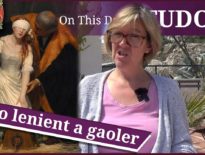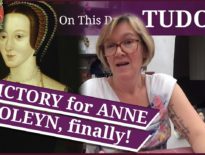On this day in Tudor history, 12th April 1550, in the reign of King Edward VI, courtier and poet, Edward de Vere, 17th Earl of Oxford, was born.
In today's talk, I introduce Edward de Vere, Earl of Oxford, and talk about his not-so-nice personality, the Oxfordian theory regarding the works of William Shakespeare, and the idea that Oxford was actually Elizabeth I's son by Thomas Seymour.
Also on this day in Tudor history, 12th April 1533, Anne Boleyn made her very first public appearance as King Henry VIII's official queen consort. She didn’t half set tongues wagging when she processed to mass accompanied by 60 ladies and dressed to the nines. Find out more in last year’s video:
Further reading on Edward de Vere, Earl of Oxford:
- https://theotherpages.org/poems/poem-uv.html#vere
- https://www.poemhunter.com/edward-de-vere/
- “Oxford: Son of Queen Elizabeth I” by Paul Streitz
- http://shakespeareoxfordfellowship.org/
- https://doubtaboutwill.org/
- https://shakespeareauthorship.com/
Also on this day in history:
- 1533 – Thomas Cromwell became Chancellor of the Exchequer.
- 1535 – Death of Giles Duwes (Dewes), musician, royal librarian and French tutor to Henry VIII's children: Arthur, Henry, Margaret and Mary, and to Henry VIII's daughter, the future Mary I. He also taught Mary I music. He was buried in the church of St Olave Upwell in London.
- 1587 – Death of Sir Thomas Bromley, Lord Chancellor to Elizabeth I, at York House in London. He was buried in Westminster Abbey. It was Bromley who had presented Elizabeth I with Parliament's petition for the execution of Mary, Queen of Scots, and it was he who applied the Great Seal on her execution warrant in 1587.
- 1639 – Death of courtier Robert Carey, 1st Earl of Monmouth, youngest son of Henry Carey, 1st Baron Hunsdon, and grandson of Mary Boleyn.
Transcript:
On this day in Tudor history, 12th April 1550, in the reign of King Edward VI, courtier and poet, Edward de Vere, 17th Earl of Oxford, was born. He was the only son of John de Vere, 16th Earl of Oxford, and his second wife, Margery Golding. Edward became Earl of Oxford in 1562 after his father’s death.
Here are some facts about this Tudor man…
• He was made a royal ward after the death of his father and William Cecil, master of the court of wards, became his guardian, and appointed tutors to educate him.
• He was granted an honorary MA from Cambridge in 1564 and from Oxford in September 1566 as one of Queen Elizabeth I’s retinue on her visits to the cities.
• He killed an unarmed man in 1567 while practising fencing, but the coroner’s jury found in his favour, ruling that the man had committed suicide by running at Oxford’s rapier.
• In 1570, after begging William Cecil for some military experience, he was sent to Scotland with the Earl of Sussex.
• In 1571, he married Cecil’s daughter, Anne, but the marriage was unhappy. I’ll give you a link to my talk on their unhappy marriage - https://youtu.be/pUXSKiNLXo8
• Oxford was not the nicest of men. In the company of friends, he made fun of the queen, then he insulted poet Philip Sidney and may even have plotted his murder. Then, in 1580, he reported his own friends, Henry Howard and Charles Arundel, to the queen for their Catholic faith.
• In 1581, he ended up in the Tower of London after his mistress, one of the queen’s ladies, Anne Vavasour, gave birth to his son. He was released after a few months and returned to his wife.
• In 1582, Oxford fought a duel with his mistress’s uncle, Sir Thomas Knyvet. They were both injured, but not fatally, although over the coming months servants of theirs would die due to their argument.
• In 1586, he served on the commission that tried Mary, Queen of Scots, and in 1589 and 1601, he was one of the peers who sat in judgement on Philip Howard, Earl of Arundel, and Robert Devereux, Earl of Essex.
• His wife, Anne, died in 1588 and in 1592 Oxford married Elizabeth Trentham, who gave him as son, Henry, in 1593.
• In 1603, he was one of those against the succession of the Scottish king, James VI, as King of England.
• Oxford died on 24th June 1604 and he was buried in St Augustine’s churchyard in Hackney, London.
• Oxford loved music, was the patron of a company of players from 1580 to 1602, acted as a literary patron, and also wrote poetry.
• Oxfordians believe that he wrote the poems and plays attributed to William Shakespeare, but his biographer, Alan H. Nelson, and many others believe that this theory is entirely without merit. I have to admit that I’m biased, having grown up just a stone’s throw from Stratford-upon-Avon, and being a big fan of Shakespeare, but the theory, along with the theories that Christopher Marlowe or Francis Bacon were behind the works, is interesting to look into. For me, the evidence put forward for Shakespeare writing the works attributed to him are far more compelling. I’ll give you a link to a video of Shakespeare scholar Professor Jonathan Bate being interviewed on this very topic - https://youtu.be/pUXSKiNLXo8
One thing that for me really points to Shakespeare having written the plays he’s famous for, is the numerous references to gloves and leather-work in his work, with glove-making being the trade of his father, John Shakespeare. My guide, Ashley, at Shakespeare’s Birthplace a couple of years ago, informed me that there are over 70 references to gloves and glove-making in William Shakespeare’s works. Interesting!
• Oh, and according to some people, Edward de Vere was also the illegitimate son of Queen Elizabeth I. Author Paul Streitz dates Oxford’s birth to 1548 and believes he was the result of the young Elizabeth’s relationship with Thomas Seymour, husband of her guardian and stepmother, Catherine Parr. The baby, he argues, was placed with John de Vere, Earl of Oxford, and he uses the fact that Edward became a royal ward and his education was overseen by people in high places, such as William Cecil, as evidence that Edward was royal. I don’t find that theory compelling either. Cecil was Master of the Court of Wards and this was the late Earl of Oxford’s on. There’s nothing at all unusual in what happened.
Still, this story does add interest to the story of Edward de Vere, Earl of Oxford.
I’ll give you some links for further reading on Edward de Vere, the Shakespeare authorship question, and works by Oxford…
Also on this day in Tudor history, 12th April 1533, Anne Boleyn made her very first public appearance as King Henry VIII's official queen consort. She didn’t half set tongues wagging when she processed to mass accompanied by 60 ladies and dressed to the nines. Find out more in last year’s video - https://youtu.be/3vKjaT3H1Kc
https://theotherpages.org/poems/poem-uv.html#vere
https://www.poemhunter.com/edward-de-vere/
“Oxford: Son of Queen Elizabeth I” by Paul Streitz
https://doubtaboutwill.org/
https://shakespeareauthorship.com/



Edward de Vere is also meant to be the real Shakespeare as well as the son of Elizabeth I.
He was a great playwright in his own right and a man of learning but not Shakespeare.
The son of Thomas Seymour? Maybe but hardly by Elizabeth who could not stand the man, was fourteen at the time and did everything she could to avoid a marriage or relationship without the consent of the Council because she would lose her lands if she did so. Of course he could be the son of Seymour by some other woman, but then how did he inherit his title which went back several generations?
How many secret kids did Elizabeth have? A son by Robert Dudley, by Thomas Seymour, by goodness knows who, while having her every move watched and recorded? Of course she did.😂😂😂
The gossip machinery must have been in overdrive.
It’s tempting to say that deVere was Shakespeare. The probable use of Cecil’s library is a plus for sure. But beyond that, there is nothing that convinces me. The poetry that is accepted as his-deVere’s–I find un-exceptional. I know a few deVere-obsessed men. They reach too far.
I think it COULD be deVere, just from the amount of circumstantial “evidence”. But It’s not evidence. And Just because Orson Welles or Derek Jacoby says so, doesn’t make it so. And Welles was careful enough to say ” I THINK it was deVere. ” What I can’t tolerate is the obsessed who want us to believe that they KNOW it was deVere. My favorite acting coach–Kristin Linklater said she “cares very much about deVere.” My silent reaction to the quote is–why do you need to care about the man? He’s been dead for exactly 400 years–and no one has heard from him! Do we want to make deVere something he wasn’t–an honorable man as well as the world’s supreme poet-playwright? One of the obsessed who knew I liked Mark Twain almost as much as Shakespeare said, rather matter-of-factly: “Mark Twain said it was deVere”. Do these people think we will just accept as truth, less-than-obvious distortions of the truth? What Twain actually said was: “I don’t know who wrote the works of Shakespeare. I know it wasn’t the man from Stratford.” He never even mentioned deVere’s name! This director always started rehearsals with some authorship propaganda. In this case, the director (of A Midsummer Night’s Dream) saved the Twain quote for a wrap-up. I stood up and said: “Ron, show me the smoking gun or just stick to directing. Please. ” I think the likelihood of finding the gun is slim to none. Maybe a note from Elizabeth’s hand, saying “your plays are miraculous, but you must remain in the shadows, remain anonymous, and one day things could change.”– Just an idea. There could be several such things…….and there could be none.